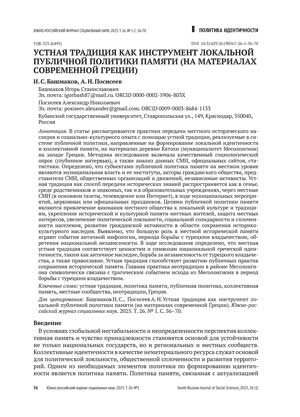Аннотация
В статье рассматриваются практики передачи местного исторического наследия и социально-культурного опыта с помощью устной традиции, реализуемые в системе публичной политики, направленные на формирование локальной идентичности и коллективной памяти, на материалах деревни Катохи (муниципалитет Месолонгион) на западе Греции. Методика исследования включала качественный социологический опрос (глубинное интервью), а также анализ данных СМИ, официальных сайтов, статистики. Определено, что субъектами публичной политики памяти на местном уровне являются муниципальная власть и ее институты, акторы гражданского общества, представители СМИ, общественных организаций и движений, независимые активисты. Устная традиция как способ передачи исторических знаний распространяется как в семье, среде родственников и знакомых, так и в образовательных учреждениях, через местные СМИ (в основном газеты, телевидение или Интернет), в ходе муниципальных мероприятий, церковных или официальных праздников. Целями публичной политики памяти являются привлечение внимания местного общества к локальной культуре и традициям, укрепление исторической и культурной памяти местных жителей, защита местных интересов, увеличение политической лояльности, социальной солидарности и сплоченности населения, развитие гражданской активности в области сохранения историко-культурного наследия. Выявлено, что большую роль в местной исторической памяти играют события античной мифологии, периода борьбы с турецким владычеством, обретения национальной независимости. В ходе исследования определено, что местная устная традиция соответствует ценностям и символам национальной греческой идентичности, таким как античное наследие, борьба за независимость от турецкого владычества, а также православие. Устная традиция способствует развитию публичных практик сохранения исторической памяти. Главная практика неотрадиции в районе Месолонгиона символически связана с трагическим событием исхода из Месолонгиона в период борьбы с турецким владычеством.
Ключевые слова
Библиографические ссылки
Беляева, Н.Ю. (2007). Публичная политика в России: сопротивление среды. Полис. Политические исследования, 1, 22–31. DOI: 10.17976/jpps/2007.01.03
Малинова, О.Ю., Миллер, А.И. (2021). Символические аспекты политики памяти в современной России и Восточной Европе. В В.В. Лапин, А.И. Миллер (ред.) Введение. Символическая политика и политика памяти (с. 7–37). СПб.: Изд-во Европ. ун-та в СПб.
Мирошниченко, И.В. (2015). Публичная политика как сложносоставной концепт политической науки. В Л.В. Сморгунов, Е.В. Морозова, А.И. Кольба (ред.) Современная политическая реальность и государство: сложные методы исследования (с. 31–49) Краснодар: Кубанский госуниверситет.
Мирошниченко, И.В., Морозова Е.В. (2022). Публичная политика как пространство конвертации нематериальных ресурсов в факторы развития территорий. Политическая наука, 3, 144–163. DOI: 10.31249/poln/2022.03.07
Никовская, Л.И., Якимец, В.Н. (2007). Публичная политика в современной России: между корпоративно-бюрократическим и гражданско-модернизаторским выбором. Полития, 1, 30–51.
Хальбвакс, М. (2005). Коллективная и историческая память. Неприкосновенный запас, 2, 40–41.
Хобсбаум, Э. (2000). Изобретение традиций. Вестник Евразии, 1, 47–62.
Comstock, J.L. (1829). History of the Greek Revolution. New York: W.W. Reed & co. Retrieved from https://archive.org/details/historyofgreekre00coms/page/n9/mode/2up
Hobsbawm, E.J., Ranger, Т. (Eds.), (1983). The Invention of Tradition. Cambridge: Cambridge University Press.
Kokosalakis, N., Psimmenos, I. (1996). Modern Greece: A Profile of Identity and Nationalism. In B. Strath and A. Triandafyllidou (Eds) Representations of Europe and the Nation in Current and Prospective Member-States: Media, Elites and Civil Society (pp.127–165). Brussels: European Commission. Retrieved from https://www.academia.edu/3010427/Representations_of_Europe_and_the_Nation_in_Current_and_Prospective_Member_States_Media_Elites_and_Civil_Society
Koumandaraki, A. (2002). The Evolution of Greek National Identity. Studies in Ethnicity and Nationalism, 2(2), 39–53. DOI: 10.1111/j.1754-9469.2002.tb00026.x
Koutras, N. (2015). The Affiliation between State and Churches: The Case Study of Greece. Annales UMCS, Politologia, 21, 85–95. DOI: 10.2478/curie‑2013-0006
Legg, K., Roberts, J. (1997). Modern Greece: A Civilization on the Periphery. New York. Routledge. DOI: 10.4324/9780429034787
Nora, P. (1989). Between Memory and History: Les Lieux de Mémoire. Representations, 26, 7–24.
Papanikos, G.T. (2024). The national identity of Ancient and Modern Greeks. Athens Journal of Mediterranean Studies, 10, 63–80. DOI: 10.30958/ajms.10-1-4
Tsoukalas, C. (1999). European modernity and Greek national identity. Journal of Southern Europe and the Balkans, 1(1), 7–14. DOI: 10.1080/14613199908413983
Vansina, J. (1990). Oral Tradition and Its Methodology. In J. Ki-Zerbo (Еd.). General History of Africa: Methodology and African Prehistory (pp. 142–165). California: Heinemann Publishers, UNESCO. Retrieved from https://repository.out.ac.tz/403/1/Vol_1._Methodology_%26_African_Prehistory_editor_J.KI-ZERBO%28FILEminimizer%29.pdf


